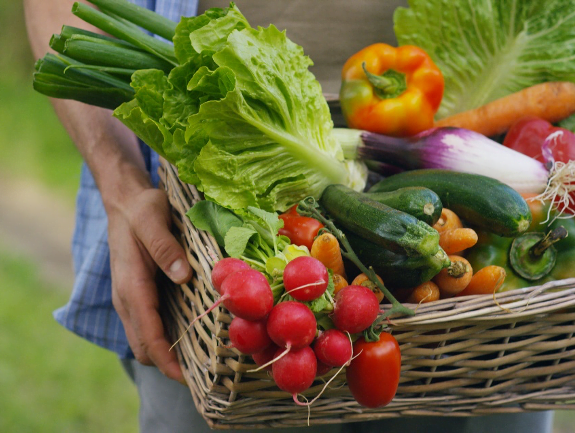How is an Organic Garden Different?
To ensure the health and mineral content of the soil, the soil is prepared and cared for using natural compost or gathered mulch. Crops are rotated after each harvest and the soil is renewed by adding composted organic matter such as leaves and vegetable scraps. The organic approach also considers the welfare of worms, insects, animals, and companion plants. Basically, with organic gardening, the idea is that “nature knows best.” Organic farmers seek to live a cleaner, healthier existence in an earth-friendly way and harvest produce with the confidence that it has been grown naturally and without harmful chemicals.
Organic Garden Health Benefits
Whether you choose to support local organic farms or set up your backyard garden, studies show that organic gardening has significant health benefits.
- Some research shows that organic produce has higher levels of nutrients, especially magnesium (28% more), vitamin C (26% more), iron (20% more), and phosphorus (14% more).
- Daily gardening may reduce the risk of dementia by up to 36%.
- One study found that low-to-moderate gardening decreased the body’s total cholesterol, blood pressure, and oxidative stress.
- Outdoor gardening can help optimize vitamin D levels through sun exposure.
- Interacting with plants can increase self-esteem and reduce anger, sadness, and stress.
- Gardening time can be used to practice mindfulness by focusing on the different tasks and appreciating the work you’ve done. Mindfulness helps to decrease stress levels.
- If you have a garden, eating the produce grown in this soil can benefit your microbiome by providing geographically local bacteria.
- Since digestion begins in the brain, just seeing, picking, and touching the produce before preparation can prepare the body for better digestion and assimilation of nutrients.
- Working in a garden provides “earthing” and offers an excellent way to detoxify from electronics.
Sanoviv’s Organic Garden
At Sanoviv, the organic garden provides the following produce regularly
- Zucchini
- Yellow Squash
- Tomatoes (various types)
- Bell Peppers
- Cucumbers
- Chard
- Kale
- Spinach
- Lettuce Mixes
- Purslane
- Radishes
- Turnips
- Beets
- Carrots
- Fennel
- Eggplant
- Strawberries
- Cilantro
- Mint
- Parsley
- Rosemary
- Basil
How to Start a Garden
If you want to get started with organic gardening, choose easy-to-grow vegetables such as zucchini, radishes, cherry tomatoes, cucumbers, carrots, and bell peppers. Decide if you want to plant in your yard, containers, or large pots depending on your physical space.
It Begins With Healthy Soil
Healthy soil should have large pores for water movement and air filtration and should be deep enough to allow plants to grow (usually about 10-12 inches). The soil needs proper nutrients, good drainage, and beneficial organisms. Plants won’t grow well in compacted soil or sandy soil. In most cases, you can improve the soil by digging down and turning it over to loosen it and then adding compost to help it retain moisture and nutrients.
You can purchase organic compost or make it yourself. Homemade compost is typically made from coffee grounds, banana peels, leaves, grass clippings, and sometimes wood ashes. This organic matter is important for improving the soil and feeding the earthworms, which help to aerate and fertilize the garden. Adding compost is a good way to improve most soils.
Use Plants that are Natural Bug Repellents
When planning your garden, many plants help keep pests under control and attract pollinators. Here are some ideas:
- Marigolds have many insecticidal components. The scent of marigold flowers can not only help keep bugs away, but they are low maintenance and don’t take up too much space.
- Citronella grass produces an oil that is a popular ingredient in mosquito repellents. If you choose to use this plant, keep in mind it can grow up to 6 feet tall and 6 feet wide, so space them accordingly. Although very effective, citronella requires filtered sunlight and frequent watering.
- Herbs that work well in a garden include basil, mint, rosemary, and lemongrass. Not only can they help repel unwanted pests, but they can be used in the kitchen or added to your drinking water for an infused flavor.
- Lavender has essential oils that help repel mosquitos and can also attract pollinators to your garden.
Whether you grow your fruits and vegetables at home or support local organic farmers, gardening is an easy way to care for the earth and our bodies.

